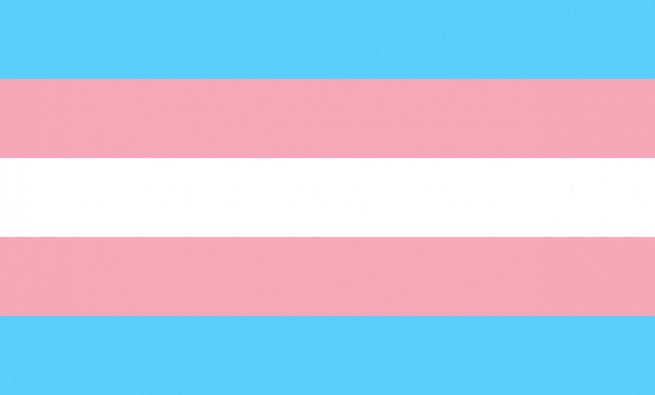
Around a year ago, give or take, Instagram suggested I follow what was clearly a secondary account for one of my friends. It was a new account, with one picture on it, and in that picture my friend was wearing eyeshadow. My friend was not the type of person for whom randomly choosing to be photographed in eyeshadow was a terribly surprising thing, so I thought nothing of it and followed the account, then forgot all about it.
A few days later my friend’s wife texted me and asked if I had any questions about her — and this is the point where I can’t come up with a coherent way to not choose gendered words, so for the moment I’ll go with “husband,” because at the time that was the word I would have used– making the decision to transition.(*) Apparently that account wasn’t really meant for full public attention yet. Whoops! I laughed and said that I’d found it in suggestions and followed it and not thought about it for another single second and then went on to have the type of conversation that you typically have when an adult makes a decision like that.
My son is seven. He and their youngest son are just a couple of weeks apart in age, and have been best friends for more or less forever despite them having moved a couple hours away a few years ago. They regularly communicate via the Facebook Kids Messenger app and play Roblox together. My son is aware that his friend now has two moms, and has literally never asked a single question about it or displayed the slightest bit of confusion about it.
The other day I was sitting in my recliner while he was on the couch talking to his friend, and the iPad is loud, so it’s kind of hard to not overhear their conversations and I try to keep half an ear on him while he’s on the thing anyway just because, y’know, parenting. And I hear his friend tell him that he has decided to change genders and be a girl, and that he wants to use feminine pronouns now, and be known by a different name. And, well, I went from paying halfassed attention to listening carefully quick.
And … my son says “Okay,” and immediately starts arguing with her about whether “dude” is a gender-neutral term or not, and whether “dudette” is something that he should be using now, because that’s where his priorities lie, and went right back to playing Roblox.
Now, has he been great about not deadnaming his friend? No, he hasn’t– he’s pretty much sticking with “dude” most of the time, and I’ve definitely heard far more uses of the original name than the new one over the last couple of weeks. And there was a brief discussion between the two of them later about whether his friend could really be a girl or not, because girls can have babies and boys can’t. This led to the only parental intervention I’ve had to make in this entire process, where after they were done with the conversation I pulled him aside and explained the difference between gender and sex, to which he reacted by absorbing the information and shrugging and saying “Oh, okay.”
We were over at my parents’ house earlier this week and their family came up in conversation. My mom was aware of the parental transition but not the kid’s, and after a few minutes called my son into the room and asked him what he thought about it.
“Oh. Yeah, he changed genders. He’s a girl now.”
And that was the end of it. He was done talking.
So … okay, not great on pronouns, but he’s seven. It was as if his friend had changed favorite colors or something. In my son’s head, it’s no big deal.
This is the second time in a few weeks that my son has encountered the concept that people exist who are other than cis and straight, and just like the first time, he just rolled with it. And it’s not because either my (cis, straight) self or my wife’s (cis, straight) self are some sort of woke paragons of allyship. We aren’t. I’m pretty sure we’ve literally never had a direct discussion about sexual orientation with him. It’s because this isn’t actually all that complicated to explain to kids and because if kids see their parents treat something as normal they will too.
Some kids have two dads.
Some kids have two moms.
Sometimes men love men, and sometimes women love women, just like Mommy and Daddy love each other.
Sometimes people decide that they aren’t boys or girls anymore, and sometimes people decide that they’ve always been a boy or a girl and that it’s okay to let the world know that too.
“How do we explain this to our children?” is a cop-out, and it always has been. It’s just not that goddamn complicated. You just treat it like it is: normal.
Happy Pride Month, y’all.
(*) If at any point in this post I fuck up my phrasing, call me out on it and I’ll fix it.

I love this.
You’re right. Kids see something as normal until adults make some kind of big deal over it.
LikeLiked by 1 person
“People can love whoever they want. Some men love women, and some women love men. Some men love men, like your Dad’s cousin X does, and some women love women, like your Aunt X and Aunt Y do.” That is the exact “speech” that I gave my daughter at the age of 5, 6, 7, etc. Her reply? “Oh, ok.”
My daughter identifies as gender neutral, with they/them pronouns. Ok.
I have a lot more success using the preferred pronouns in writing, where I can back up and rewrite. I have more trouble using them when speaking. But they know it’s not intentional.
They have several friends who are gender neutral or trans. It easy to use their preferred pronouns when they are introduced as that gender. The only time I have trouble with them is I meet a parent to whom the child is not “out” to or who doesn’t agree with their child’s wishes. Then I have to refer to the child one way with the parent, and another way when the parent is not present. But my daughter has explained that any mis-referencing is not intentional, and they all seem to get it and don’t get mad when it happens.
They also all know that our house is sanctuary. If they get thrown out of their house, or just need to get out of their house for a bit, they are welcome here. Parents must be informed, because I don’t want to get arrested for kidnapping! But we offer shelter, a bed, food, whatever is needed. And we’ve been called on this more than once, so our daughter knows we mean what we say.
LikeLiked by 2 people
That’s about where I’m at. I have to slow down when talking about my friend to make sure I get names and pronouns right, which I attribute at least partially to the fact that because they live far away I don’t see them that often– the last time I saw her was RIGHT after announcing the transition and she was still outwardly as masculine as she had been, which is manifestly not the case now. In a real way I haven’t met the “new” her yet, and I’m hoping the errors minimize once that’s not the case.
LikeLiked by 2 people
Talk to her when you see her next. Tell her you’re happy for her, and will do your best to use correct pronouns, but that you’ll probably slip at least a few times, and that will NOT be intentional, and you won’t get mad if she corrects you. She may be relieved to know that you’re down with it, and will gently remind you when she needs to. My daughter is usually the one to remind me.
LikeLiked by 1 person
A friend of mine’s daughter is a Gen Z teen. He is Gen X, I’m Gen Y. We often discuss how easygoing it is for her friends to just accept everyone as they are, with no struggles at all regarding pronouns. I wish it wasn’t so ingrained for the rest of us.
At work I deal with the public a lot, and I’ve been making an honest effort to say they/them to everyone, and to switch from “hey guys” (which still refers to everyone) to “hey folks”. I have no idea if anyone has noticed, but I hope if I talk to even one person, that it’ll make them feel comfortable and accepted.
LikeLiked by 3 people
Well done, dudette.
LikeLiked by 2 people
My daughter is trans, and she would be proud of you and your take on this… A+!
LikeLike
I love this post. Kids are still learning about everything, so their minds are way more open than most adults’ are. It seems whatever you present them with, their default reaction is Absorb, Consider, Shrug, Accept. Which comes out as ‘Oh. OK.’ They seem totally unfazed by change or new information. We adults could learn so much from this way of being!
LikeLiked by 1 person